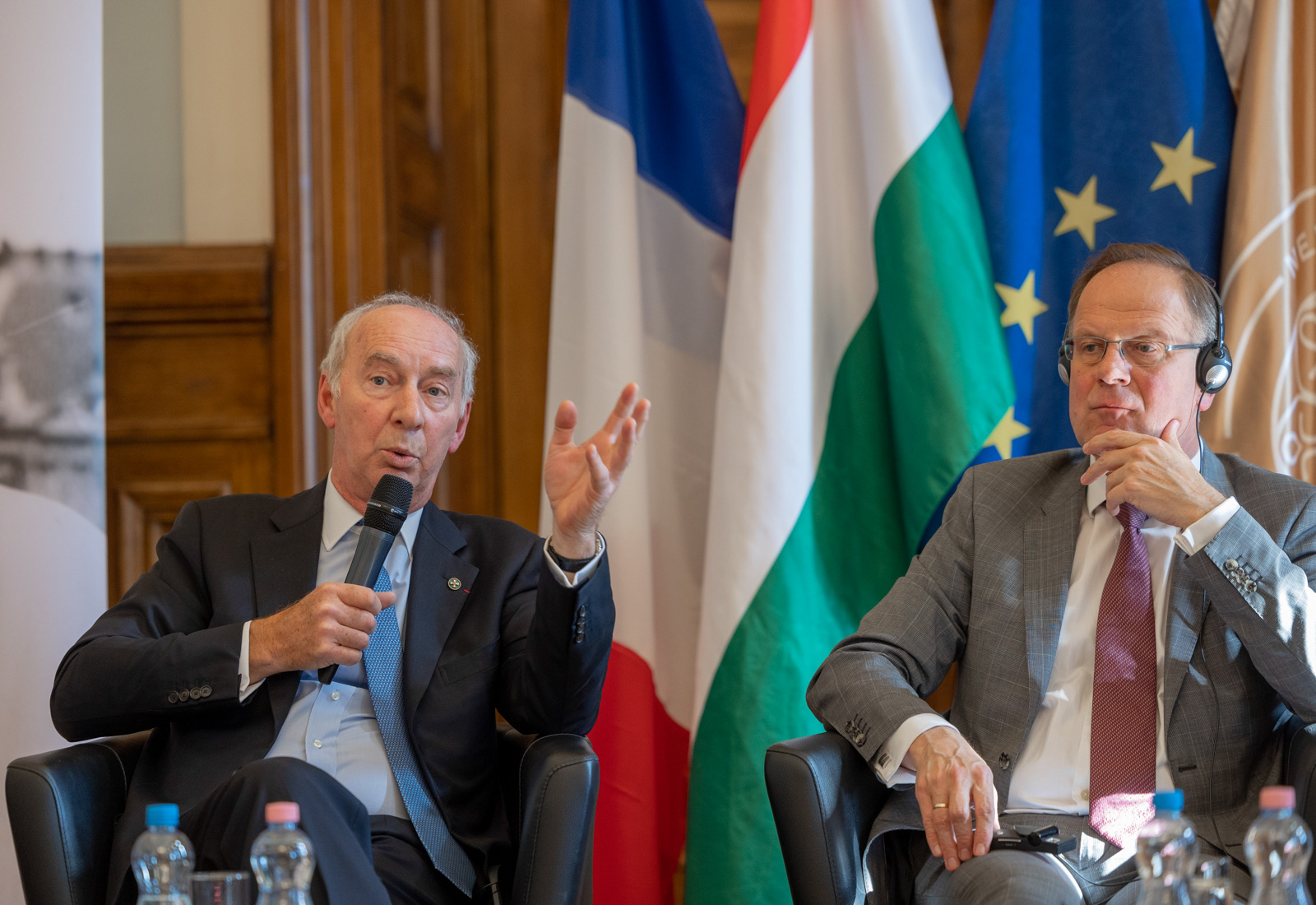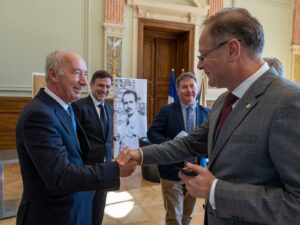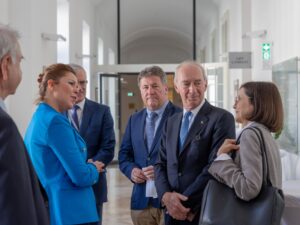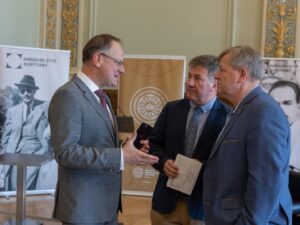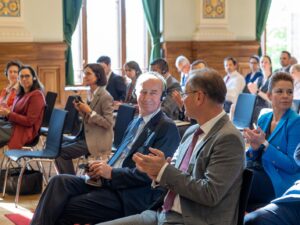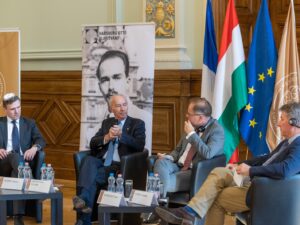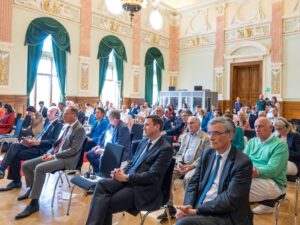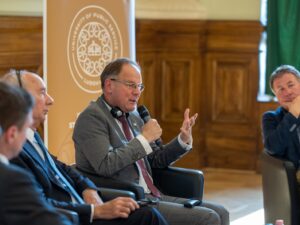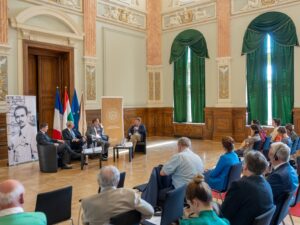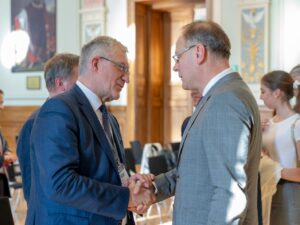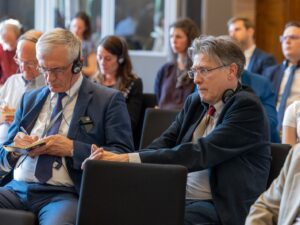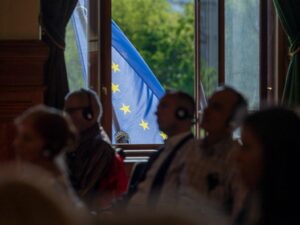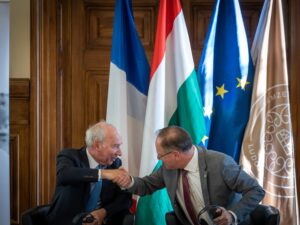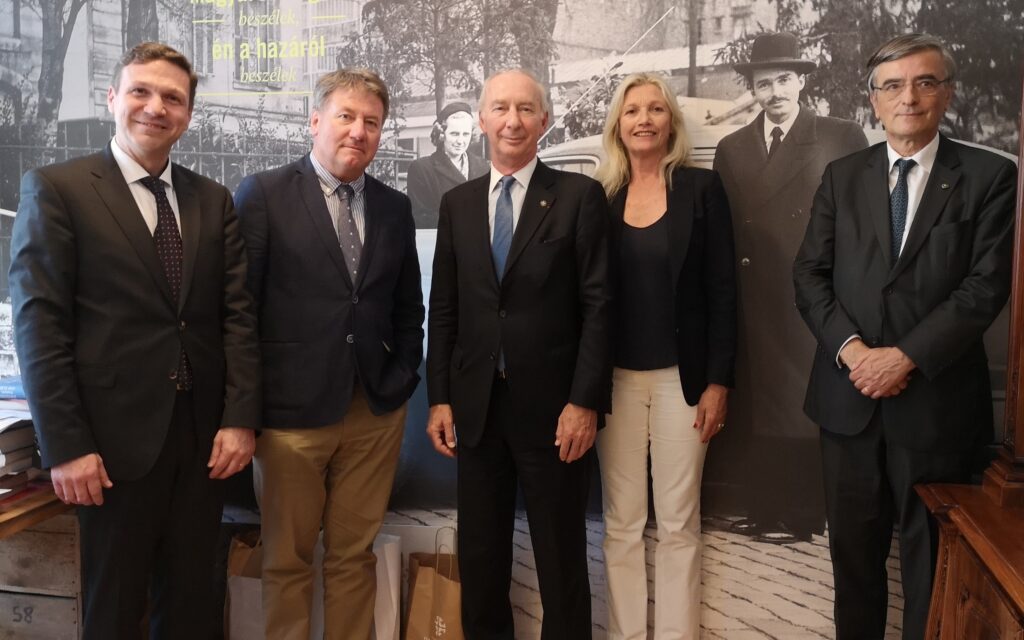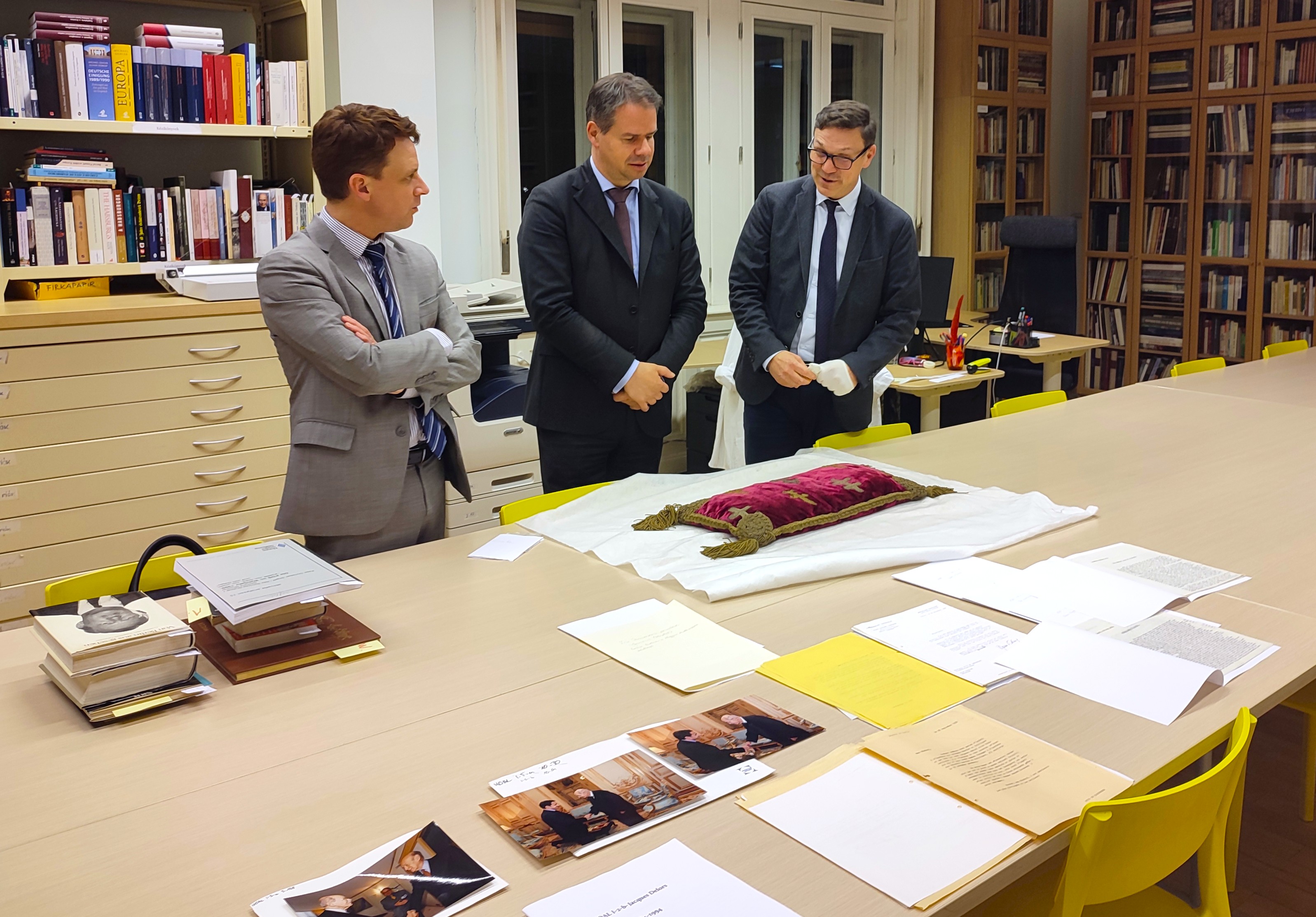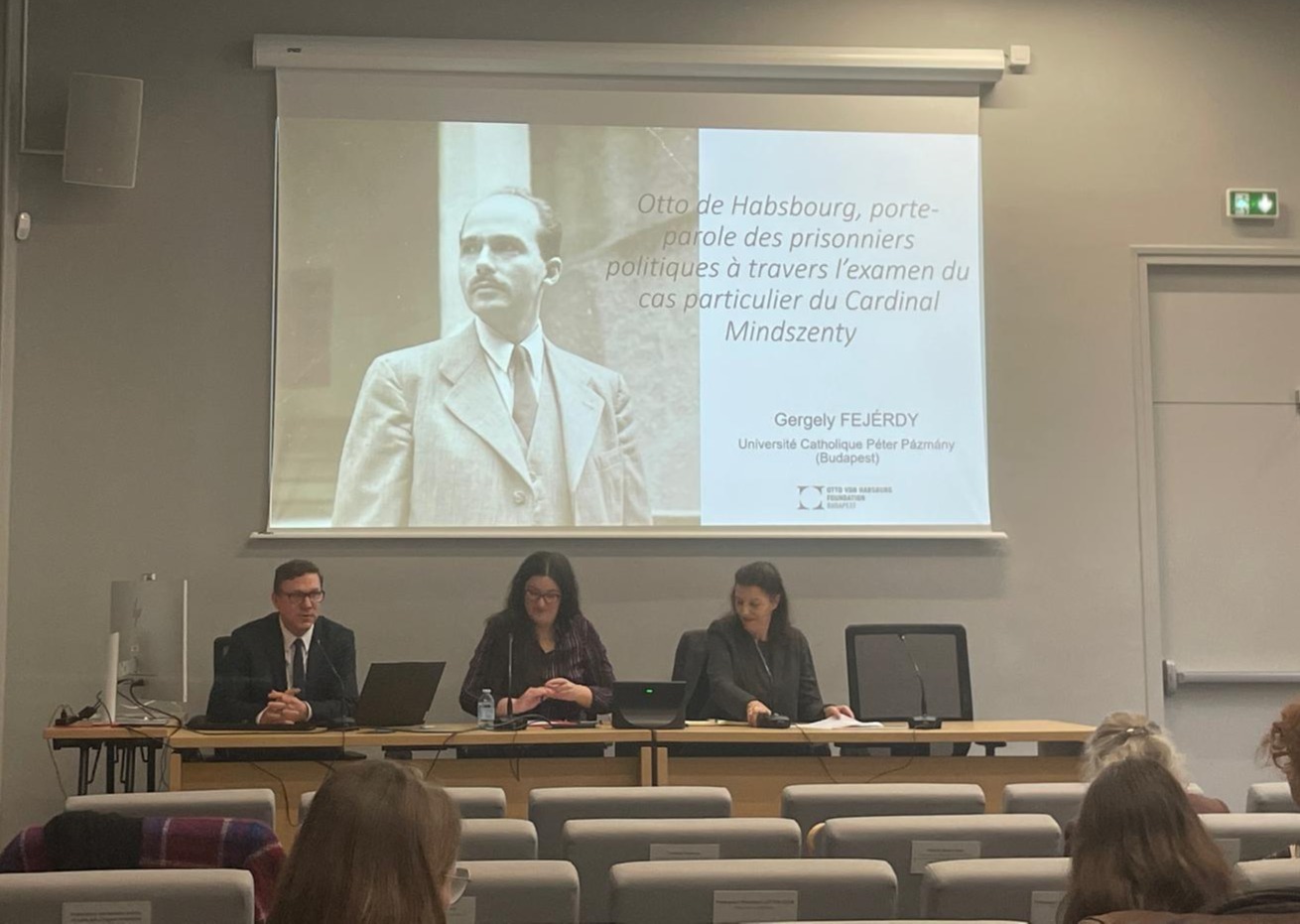On 10 May, the day after Europe Day, Jean-Dominique Giuliani, President of the Robert Schuman Foundation, visited our Foundation. The head of the renowned French think tank on European issues, who is also in close contact with President Emmanuel Macron’s EU policy makers, was invited by the Otto von Habsburg Foundation to participate in several meetings and conferences during his short stay in Budapest. He was accompanied on his trip to Hungary by Pascale Joannin, Director of the Robert Schuman Foundation.
An important event of the visit was the round table discussion entitled “Essential Europe”, organised jointly by the Institute for Strategic Studies of the National University of Public Service and our Foundation. On this occasion, Jean-Dominique Giuliani and Tibor Navracsics, Member of Parliament and former EU Commissioner, were in conversation with Gergely Prőhle and Gergely Fejérdy. The discussion was given a special context by the speech of the re-elected French President Emmanuel Macron in Strasbourg on 9 May, his visit to Berlin and the formation of the government in Hungary.
Above all, Jean-Dominique Giuliani stressed the importance of preserving the unity of Europe. In his opinion, crises such as Covid-19 or the war in Ukraine encourage the continent’s politicians to work more closely together. He said that the deepening of the Union will accelerate, and he would be very sorry if our country was left out of this process. He put it this way:“It would be a shame if Hungary were left at the station when the train leaves.” According to Tibor Navracsics, there is a need for greater flexibility in the deepening of integration, and it is important to take into account the differences arising from the historical and geopolitical situation. He stressed that mutual cultural understanding between the peoples of Europe is essential for real unity. The President of the Robert Schuman Foundation agreed on the importance of the cultural dimension, but said that the focus should be on what unites Member States rather than what distinguishes them. He said it was important to find appropriate responses to the concerns of EU citizens. In his remarks, he highlighted the economic and military dimensions, where greater progress is expected in the near future.
On this latter topic, the case of the Austro-Hungarian Monarchy was mentioned as an example, where the language of command and the budget of the common army were a constant source of controversy. The two speakers agreed that military policy should not be based on the model of the European Defence Community, which failed in 1954, but rather on a common strategy. The “strategic compass” adopted in March points in this direction. Jean-Dominique Giuliani recalled that the European Union is founded on the principle of protecting all Member States and guaranteeing the same rights. At the same time, the President of the Robert Schuman Foundation believes that it is important to be willing to relinquish certain national jurisdictions in order to respond effectively and efficiently to the challenges of the present.
In this regard, Tibor Navracsics said that there have been several occasions in recent times when larger Member States, including France, have been able to allow itself more than other EU members. On the non-respect of the Maastricht Criteria and the Commission’s “generosity” in this respect, he quoted Jean-Claude Juncker as saying that “France is France”, meaning that it can allow itself more. While stronger cooperation is indeed needed in some areas, the principle of subsidiarity must not be lost sight of. Similarly, it is unfortunate to place the importance of building institutions ahead of building communities. He drew attention to the fact that common institutions cannot function without the political community (the demos) that supports them. According to the former EU Commissioner, there is a certain European demos emerging around some issues that concern everyone – such as migration or climate protection – and Erasmus programmes for young people can play an important role in shaping this new demos. These examples can be the building blocks of a new kind of European identity, but they are not yet strong enough, not yet consensual enough, to build a stronger institutional system on them. At the same time, they both acknowledged that European integration is only possible through the strengthening of the European demos, and that it must be based on cultural community-building and better mutual understanding.
The French guests visited the Otto von Habsburg Foundation, where they saw, among other things, a book dedicated to our namesake by Charles de Gaulle. Jean-Dominique Giuliani recounted his own experience of meeting the former heir to the throne, as he was present when President Jacques Chirac awarded Otto von Habsburg a high distinction in 2004. Giuliani recalled how impressed he had been at the event by the insightful speech given by the honoured MEP, who analysed the links between the present and the past. The good personal relationship between Otto von Habsburg and Robert Schuman was also mentioned, which could be an important inspiration for future cooperation between the two Foundations.
Event photos by Zsolt Burger
